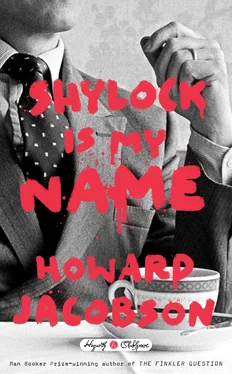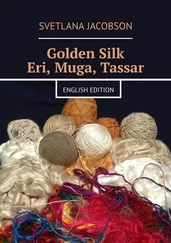For which we wish him to perdition.
That, anyway, with no expectation that anything would occur to change it, was the state of Strulovitch’s feeling towards D’Anton, in the period before Shylock showed up.
And D’Anton?
Well, he had no argument with Strulovitch, if he could remember who Strulovitch was. He certainly didn’t hate him. He hated no man. Least of all did he hate on racial grounds — his French Guinean origins, the breadth of his travels, the number of languages he spoke, his love for Japanese and Chinese art, the natural affiliation he enjoyed with ceramicists, glass-blowers and miniaturists from all ages and all countries — attested to this. Strulovitch — and now circumstances had thrown the fellow into his path, yes, yes he could summon up an unwanted image of the man — had a persecution complex. One of those Jews who was far more conscious of his Jewishness than Gentiles were — indeed it would never have occurred to D’Anton that Strulovitch was a Jew had Strulovitch himself not forced the fact of it down his and everybody else’s throat. But even then, his faith or whatever one was supposed to call it — his ethnicity, for Christ’s sake! — played no part in D’Anton’s distaste for him. He was a sore loser, that was all. Rich, tasteless, intrusive, belligerent, peevish, self-interested, self-pitying and self-destructive, imagining slights while slighting others, endlessly aggrieved, assuming the world owed him recompense for something or other — not qualities that pertained congenitally or irreversibly to a Jew, in D’Anton’s view, until a Jew made them so.
But that being the case, though he would do anything for Barnaby, he knew it wasn’t going to be easy to get Strulovitch to talk to him, let alone part with Solomon Joseph Solomon’s study for Love’s First Lesson .
Beneath it all, though, he was quietly confident. If he offered Strulovitch considerably more for the painting than he had paid, would the Jew be able to resist the allure of so quick a profit?
“I’m not,” the footballer said, “before you ask, what you think I am.”
“A Nazi?”
“I’m not.”
“So why did you bring it up?”
“Because I know it’s what you’re thinking.”
“Why do you think it’s what I’m thinking?”
“Because it’s what everybody’s thinking.”
“And why is everybody thinking it?”
“Because I gave a Nazi salute.”
“So easy to be misconstrued,” Strulovitch said with a sigh but, before he could say more, Beatrice interposed her presence between the two men. “Correction,” she said, tapping Howsome’s wrist, as though with an imaginary fan, “because you gave a parody of a Nazi salute.”
“Right,” Howsome said. “Plus I didn’t know it was a Nazi salute.”
“Then how,” Strulovitch patiently pursued, “could you have been parodying it?”
Again Beatrice saw this as something she was better equipped to answer than her boyfriend. “Come on, Daddy,” she said, “you know as well as anyone how ironic referencing works.”
Howsome smiled at her in pride and nodded. This was what he’d fallen in love with the first time he heard her speak.
Strulovitch, too, was proud. He suppressed a pang for poor Kay, missing out on these flashes of smartness from a daughter who most of the time played dumb. So was it the smart Beatrice or the dumb Beatrice who had fallen for Howsome? He was surprised not to be more appalled by the footballer. He could half see what Beatrice saw in him. A sort of chthonic innocence, was it? He didn’t look like a Nazi. But then one never really knew what a Nazi looked like until it was too late. He was touched by something in him, anyway. Maybe it was the sight of so much muscle constrained by an expensive suit made to look cheap by so much muscle. He sat on the edge of the sofa like a boy dressed up to meet his grandparents. His tie, with its big, perfectly triangular knot, had him uncomfortably by the throat. A tattooed green and scarlet dragon also had him by the throat. It was a wonder he could breathe. Though brought up to be a wearer of ties himself—“A tie shows respect,” his father, who wouldn’t ever wear a skullcap, used to say — Strulovitch forsook them when he became an art collector. He had thought about digging one up for this occasion but decided against, whatever its formality. There was no fine point of etiquette that said a father interviewing an accidental Nazi sympathiser who wanted to sleep with his daughter had to wear a tie. Should carry a pistol or brandish a horsewhip, but no mention of a tie. So he wore his customary black suit and a white shirt with long, soft, pointed collars buttoned at the neck. I hope he sees a connoisseur, he thought. A connoisseur of art, and men. I hope he sees how much I see and how little impressed I am by empty assurances. Or by tattoos, come to that.
For some reason or clutch of reasons he was not sure he wanted to investigate he had asked Shylock to make himself scarce while the interview was in train. Maybe stay in his room. Maybe not sing along to George Formby.
“Are you frightened I will put the wind up him?” Shylock wondered.
“Of course not.”
But then what was he frightened of?
“Just call me if you need me,” Shylock said, as much to help Strulovitch out of his embarrassment as anything else.
“Why would I need you?”
“Should he turn violent…”
“It’s more likely to be Beatrice who turns violent.”
“Ah, well then I’ll be no use to you at all.”
They laughed together — Strulovitch’s laughter a bitter jeer, Shylock’s a death rattle from the back of his throat — at what wasn’t funny.
Unworthy daughters betrayed unworthy fathers. Where was the joke in that?
“What, Jessica? Why, Jessica, I say?”
He would never forget his last words to her. Do as I bid you. Shut all doors after you. Don’t thrust your head into the street.
Was that really so much to ask?
He knew he should not have left his house. He could go on blaming her through all eternity, but he should have stayed home. There was some ill towards him brewing. He’d smelt it.
What news on the Rialto?
Why so jumpy? And if so jumpy, why go out?
I am right loath to go . Then don’t.
Drawn to danger, like a cat, he went anyway, to eat a supper he didn’t relish, in company he hated. There was, though, more than one kind of dining. Admit it, admit it to yourself, you went for the pure malicious fun of it, to dine on Christians. To feed, like a cannibal, your ancient grudge.
And while you were out…
And while he was out they fed on him.
Who, as a matter of dramatic interest, hated whom the more?
Not a wafer’s thickness between them—
You called me dog…
I am as like to call thee so again…
But since I am a dog, beware my fangs…
They couldn’t tear themselves apart from each other. A bond of mutual fascination. The magnetic force of indurated revulsion. Money the pretext. This one lent at interest; that one would do no such thing — although I neither lend nor borrow by taking nor by giving of excess, yet on this occasion — for someone else, a person dear to me — I will break my custom. Called having your cake and eating it, Shylock thought, remembering the fathomless impertinence of Antonio’s “yet.” As though he were doing Shylock a favour by asking. O father Abram, what these Christians are!
But if money was the battlefield on which they fought their ancient grudges, it was not the origin of their war.
Who, as a matter of historical interest, hated whom the more? A chicken-and-egg question. Attend that word “ancient.” The villainy each saw in the other — the proud exclusiveness on this side, the proud pretence of loving kindness on that — pre-dated the rise of capitalism and usury. What movement of men and ideas, you might ask, didn’t it pre-date? The divisive words of Paul the Apostle, maybe. Before Paul, peace. But then before Paul there were no Christians for Jews to hate or be hated by.
Читать дальше












